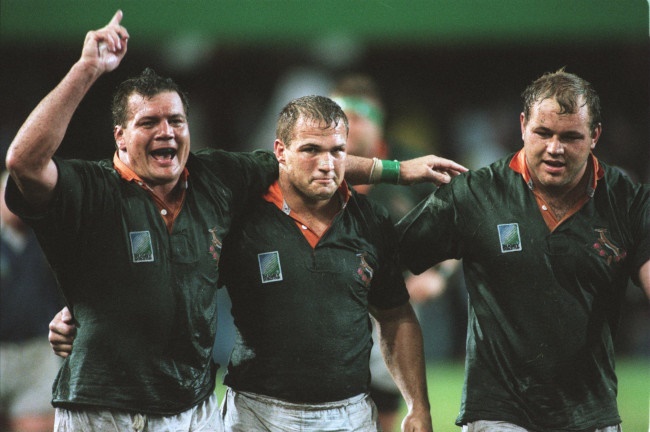


Balie Swart, Chris Rossouw, Os du Randt (Credit: Shaun Botterill/ALLSPORT)
- No team in rugby is most dangerous when backed into a corner than the Springboks, an aura that began with the 1995 Rugby World Cup triumph.
- Like Mohammad Ali facing George Foreman in the Rumble in the Jungle, the Boks were given scant hope of slaying the giant All Blacks.
- When Siya Kolisi‘s Boks were written off before the final against England in Japan last year, they would not have wanted it any other way.
The first question posed at then-SA Under-20 coach Dawie Theron moments after his young men lifted the 2012 Junior World Cup was: “Did that match remind you of the 1995 final?”
The comparisons were obvious.
South Africa was the IRB Under-20 Championship host nation and they went on to beat the Baby Blacks in the final at Newlands, with a team featuring prodigious scholar Handre Pollard.
By then, a mystique had built around the green and gold jersey that countries around the world have come to respect and fear in equal measure.
It’s a spirit, an aura that hovers like a halo over the Springboks whenever their backs are firmly planted against the wall and it began on this day, 24 June 1995.
The Springboks facing the All Blacks at Ellis Park in the 1995 Rugby World Cup final was not unlike Mohammad Ali facing George Foreman in the “Rumble in the Jungle” in former Zaire. If you threw a stone in Vegas, you would hit a bookie that had odds firmly in Foreman’s favour.
Like Ali, the Springboks were given little hope. Why would they win when their opponents boasted the most fearsome living athletic specimen ever seen at that time, Jonah Lomu?
The Boks had laboured to a 19-15 win over France in the semifinals at a wet and miserable Kings Park. The ground was unfit for farming let alone playing a World Cup rugby game but officials forged forward and kept the hosts in it.
And even during the arm-wrestle with Les Bleus, Abdel Benazzi gave them the biggest scare when he looked to have licked the try line but officials deemed that he was stopped short. The Boks won ugly, in almost every respect.
Au contraire, New Zealand went through England like a luxury saloon swooshing through the German autobahns. They looked larger and meaner, like the “Monstars” in Space Jam, about to squish Michael Jordan.
Spectators who knew little of this secluded rugby nation in its time of sporting isolation, feared for Lomu’s opposite number, James Small, or whoever dared attempt to tackle him, that he would be left for road kill like England’s Mike Catt in the semifinals.
But the Springboks wrote into the history books the kind of history that lives long into folklore. By defeating the All Blacks in that ‘95 final, they set a blueprint for future-generation Boks to follow and for the rest of the world to dread.
Years later, the Springboks would find themselves against similar ropes and the All Blacks would remain the North Star the world would follow in rugby excellence.
But whenever the Boks seemed out of it, written out of any equation, they found their halo again and triumphed against seemingly insurmountable odds. Such as when they came back from 23-5 down, as late as the 67th minute, in Durban to beat the All Blacks 24-23 and clinch their first Tri-Nations title in 1998.
There were more times the Boks would do the unthinkable, especially against their old foe. Like in 2006, a week after they were pasted 45-26 at Loftus, the Boks came back to win 21-20 in Rustenburg, to further entrench the notion that you should never bet against them.
The Dunedin Test in 2008 ended a century of pain where the Boks had never beaten the All Blacks at Carisbrook. What made that victory improbable was that they had lost three straight Tests against the Kiwis and they were touring New Zealand for the first time under their new coach, Peter de Villiers. They also had not won in New Zealand since 1998.
Somehow, they did it once again by coming from behind to seal victory with one of the sweetest tries Ricky Januarie, or any Springbok for that matter, will ever score.
And when they beat the All Blacks in Wellington in 2018, a year after the ignominy suffered in Albany (a 57-0 loss) and two years after the Durban disaster (57-15), it prompted those who knew the power of the badge to let the world know not to rule the Boks out of winning the 2019 Rugby World Cup.
When Siya Kolisi and his men strode onto the pitch at Yokohama International Stadium last year, they were again the underdogs to England’s favourites, and were written off before kick-off. They would not have wanted it any other way.

